I have been a Neo-Pagan for over ten years. During that time Ive explored a few of the branches within the faith, including Wicca and shamanism. As a local Pagan Pride Day coordinator, Ive had the chance to learn about other Neo-Pagan faiths like Asatru and Druidry, but writing this book greatly improved my knowledge of both.
It was wonderful to brush up on ancient Pagan and modern Neo-Pagan history, and to learn about practices I didnt fully grasp, like those of Santera and Vodoun. As I wrote, I was even more impressed by the wide variety of faiths practiced under the Neo-Pagan umbrella.
Paganism has long brought deeper meaning to my life, and I hope this book will help you explore a branch of religion that will perhaps touch you as deeply as it has touched me.
Contents
How to Leave a Group
Acknowledgments
I would like to thank the following people for their valuable advice and support during the writing of this book: Brian Ewing for advising on the legal chapter and understanding when I couldnt go out to dinner because I had to write, and Ed and Dorothy Kennedy for reviewing the early chapters. Michael Gorman, Druid Founder of the Sacramento Grove of the Oak, Inc., and Lisa Tonner both generously offered to review the chapters on Druidry and Asatru. Their corrections helped me better understand both faiths, and will benefit your understanding as well. Sheela Ardrians editing and advice greatly improved the chapter on alternative sexuality. Special thanks also to Karen Tate for her help with Egyptian history. Id also like to thank those who chose not to be named. I couldnt have done it without you.
The Top Ten Myths about Pagans
Pagans worship the devil.
Pagans can fly on a broomstick and have special magical powers.
Pagan women are nymphomaniacs and all Pagans have wild orgies every night.
Pagans lack a code of ethics and are amoral.
Pagans worship outdated gods and goddesses.
Pagans were all raised by hippie nomads.
Pagans practice animal sacrifice.
Pagans live in wooden huts outside of society.
Pagans are a very small minority of the population.
Pagans dont have the same legal rights as members of other religions.
Introduction
 PAGANISM IS SOMETIMES DEFINED as any non-Judeo-Christian or Muslim religion. By this definition, Buddhism, Hinduism, and many other faiths are Pagan, but for purposes of this book, Paganism refers to a group of religions that promote reverence for the earth and/or the deities of pre-Christian religions. The term Neo-Paganism applies specifically to Wicca and other religions that were created during the last century or two. Some Druids call themselves Neo-Pagans, but others dislike the term because they associate their beliefs with older traditions. Asatruars and other reconstructionists sometimes balk at the term Neo-Pagan because they attempt to reconstruct the original beliefs and practices of a specific people rather than creating new beliefs. Santerians, Native Americans, and Vodouns are not Neo-Pagan because they practice older religions with a direct heritage of worship and belief. When talking about themselves, many Neo-Pagans shorten the term to Pagan, and Santerians, Native Americans, and Vodouns dont usually call themselves Pagan at all.
PAGANISM IS SOMETIMES DEFINED as any non-Judeo-Christian or Muslim religion. By this definition, Buddhism, Hinduism, and many other faiths are Pagan, but for purposes of this book, Paganism refers to a group of religions that promote reverence for the earth and/or the deities of pre-Christian religions. The term Neo-Paganism applies specifically to Wicca and other religions that were created during the last century or two. Some Druids call themselves Neo-Pagans, but others dislike the term because they associate their beliefs with older traditions. Asatruars and other reconstructionists sometimes balk at the term Neo-Pagan because they attempt to reconstruct the original beliefs and practices of a specific people rather than creating new beliefs. Santerians, Native Americans, and Vodouns are not Neo-Pagan because they practice older religions with a direct heritage of worship and belief. When talking about themselves, many Neo-Pagans shorten the term to Pagan, and Santerians, Native Americans, and Vodouns dont usually call themselves Pagan at all.
Collectively, Paganism is one of the most rapidly growing religions in the world. It is a beautiful, life-affirming faith that honors the land and all its creatures. Because it has revived the old gods, it is sometimes called the Old Religion. Whatever the name, many people have found that the faith fills a void theyve long carried.
Have you ever wondered what happened to the ancient gods you learned about in grade school? Have you ever felt the need to sit beside a tree and listen to it speak? Do lights twinkle at the corners of your eyes and you wonder if they might be faeries? Do animals visit you in your dreams, carrying powerful messages? Do you notice the cycles of the moon and feel a special significance on the solstices and equinoxes? Do you believe Viking lore has much to offer todays society? Do you feel a call to the sacred sites of Ireland and England? If the answer to any of these questions is yes, you just might be Pagan!
This book has several goals. The first is to educate people who feel drawn to an alternative faith, but arent quite sure what that means. You might have researched many beliefs, and maybe tried a few practices. This book gives an overview of several of the major Pagan faiths and some of the minor ones. It also offers insights on how many aspects of human life tie into Paganism and how to incorporate Paganism into your life.
Paganism cant be learned in a day, and you could spend decades researching every branch and every facet. The EverythingPaganism Book aims to give you an overview so you can decide how to start your life as a Pagan and research more specifically from there. It will also give you the tools you need to get started. And if you are a Pagan who wants to know more about another branch of Paganism you are not familiar with, this book can serve as a light refresher on the most important aspects of each faith.
If you need help explaining your Pagan beliefs to someone close to you, this book is a handy tool for conveying your message, and it offers a few tips on just how to do it. As youll see, being Pagan is a daily experience and a constant learning process. Even after ten, twenty, or thirty years as a Pagan, youll discover new information or wander down a new road to wisdom.

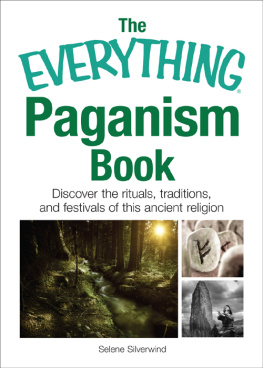

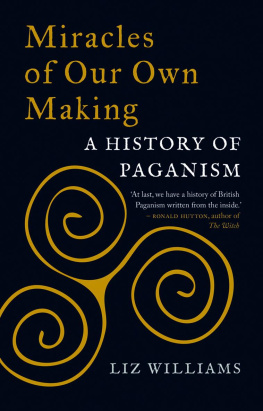
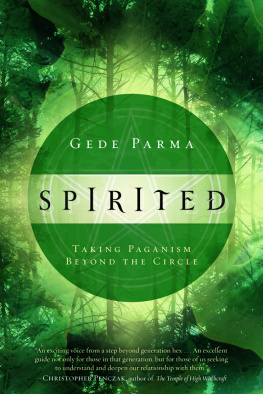
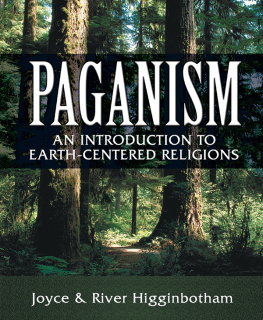
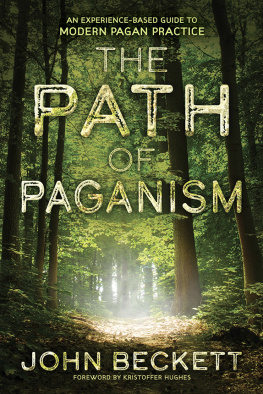
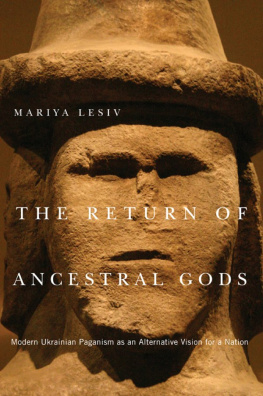
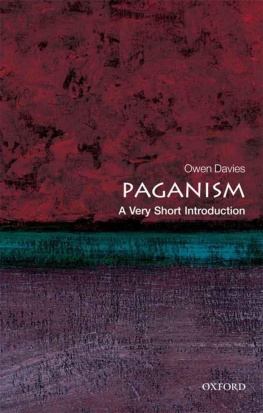
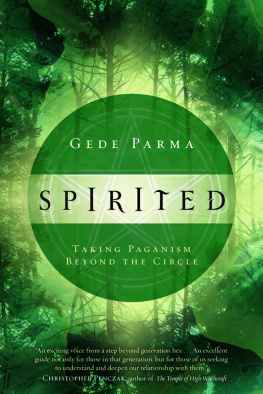
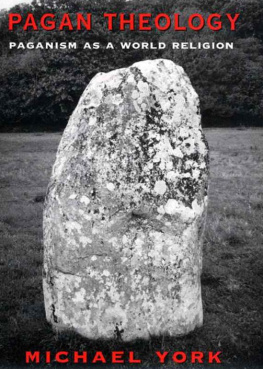






 PAGANISM IS SOMETIMES DEFINED as any non-Judeo-Christian or Muslim religion. By this definition, Buddhism, Hinduism, and many other faiths are Pagan, but for purposes of this book, Paganism refers to a group of religions that promote reverence for the earth and/or the deities of pre-Christian religions. The term Neo-Paganism applies specifically to Wicca and other religions that were created during the last century or two. Some Druids call themselves Neo-Pagans, but others dislike the term because they associate their beliefs with older traditions. Asatruars and other reconstructionists sometimes balk at the term Neo-Pagan because they attempt to reconstruct the original beliefs and practices of a specific people rather than creating new beliefs. Santerians, Native Americans, and Vodouns are not Neo-Pagan because they practice older religions with a direct heritage of worship and belief. When talking about themselves, many Neo-Pagans shorten the term to Pagan, and Santerians, Native Americans, and Vodouns dont usually call themselves Pagan at all.
PAGANISM IS SOMETIMES DEFINED as any non-Judeo-Christian or Muslim religion. By this definition, Buddhism, Hinduism, and many other faiths are Pagan, but for purposes of this book, Paganism refers to a group of religions that promote reverence for the earth and/or the deities of pre-Christian religions. The term Neo-Paganism applies specifically to Wicca and other religions that were created during the last century or two. Some Druids call themselves Neo-Pagans, but others dislike the term because they associate their beliefs with older traditions. Asatruars and other reconstructionists sometimes balk at the term Neo-Pagan because they attempt to reconstruct the original beliefs and practices of a specific people rather than creating new beliefs. Santerians, Native Americans, and Vodouns are not Neo-Pagan because they practice older religions with a direct heritage of worship and belief. When talking about themselves, many Neo-Pagans shorten the term to Pagan, and Santerians, Native Americans, and Vodouns dont usually call themselves Pagan at all.